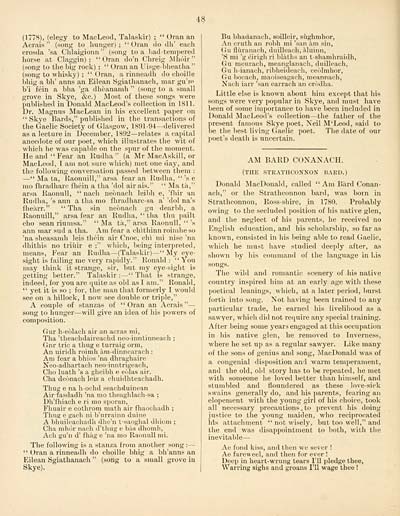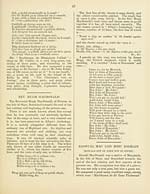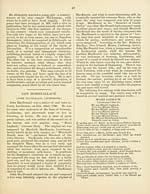Download files
Complete book:
Individual page:
Thumbnail gallery: Grid view | List view

(177S), (elegy to MacLeod, Talaskir) ; " Oran an
Acrais " (song to hunger); "Oran do dli' each
crosda 'sa Chlaigionn " (song to a bad-tempered
horse at Claggin) ; "Oran do'n Chreig Mhoir"
(song to the big rock) ; " Oran an Uisge-bheatha "
(song to whisky) ; " Oran, a rinneadh do choille
bhig a bh' anns an Eilean Sgiatlianach, mar gu'ii>
b'i fein a bha 'ga dheanamh " (song to a small
grove in Skye, &c.) Most of these songs -were
published in Donald MacLeod's collection in ISU.
Dr. Magnus MacLean in his excellent paper on
"Skye Bards," published in the transactions of
the Gaelic Society of Glasgow, LS91-94 — delivered
as a lecture in December, 1892— relates a capital
anecdote of our poet, which illustrates the wit of
wliich he was capable on the spur of the moment.
He and " Fear an Kudha" (a Mr MacAskill, or
MacLeod, I am not sure which) met one day, and
the following conversation passed l^etween them :
— " Ma ta, liaonuill," arsa fear an Rudha, " 's e
mo fhradharc fhein a tha 'dol air ais." " Ma ta,"
arsa RaonuU, " nach neònach leibh e, 'fhir an
KuiUia, 's ann a tha mo fhradharc-sa a' 'dol na's
fheàrr." " Tha sin neonach gu dearbh, a
Kaonuill," arsa fear an Rudha, " tha thu pailt
cho scan riumsa." " Ma ta," arsa Raonull, " 's
ann mar sud a tha. Am fear a chithinnroimheso
'na sheasamh leis thein air Cnoc, chi mi nise 'na
dhithis no triiiir e ;" Avhich, being interpreted,
means, Fear an Rudha— (Talaskir) — "My eye-
sight is failing me very rapidly." Ronald : " You
may think it strange, sir, lint my eye-sight is
getting better." Talaskir : — " That is strange,
indeed, for you are quite as old as I am." Ronald,
" yet it is so ; for, the man that formerly I would
see on a hillock, I now see double or triple,"
A couple of stanzas of "Oran an Acrais" —
song to hunger— will give an idea of his powers of
composition.
Our h-eòlach air an acras mi,
Tha 'theachdaireachd neo-inntinneach ;
Gnr trie a thug e turraig orm.
An uiridh roimh àm-dinnearach :
Am fear a bhios 'na dhraghaire
Neo-adhartach neo-inntrigeach,
Clio luath 's a gheibh e eòlas air.
Cha deònach leis a chuidhteachadh.
Thug e na h-ochd seachduinean
Air lasdadh 'na mo theaghlach-sa ;
Dh'fhiach e ri mo sporan,
Fhuair e cothroni math air fhaochadh ;
Thug e gach ni b'urrainn duine
A bhuilcachadh dhe'n t-saoghal dhioni ;
Cha mhòr nach d'thug e bàs dhonih,
Ach gu'n d' fhàg e 'na mo Raonull mi.
The following is a stanza from another song : —
" Oran a rinneadh do choille bhig a bh'anns an
Eilean Sgiathanach " (song to a small grove in
Skye).
Bu bhadanach, soilleir, sùghmhor.
An cruth an robh mi 'san am sin,
Gu fliiranach, duilleach, àluinn,
'S mi 'g eirigh ri blàths an t-shamhraidh,
Gu nieurach, meanglanach, duilleach,
Gu h-ianach, ribheideaeh, ceòlmhor,
Gu bocach, maoiseagach, meannach,
Nach iarr 'san earrach an cròdha.
Little else is known about him except that his
songs were very popular in Skye, and must have
been of some importance to have been included in
Donald MacLeod's collection — the father of the
present famous Skye poet, Neil M'Leod, said to
be the best living Gaelic poet. The date of our
poet's death is uncertain.
AM BARD CONANACH.
(THE STRATHCONNON BARD.)
Donald MacDonald, called " Am Bard Conan-
ach," or the Strathconnon bard, was born in
Strathconnon, Ross-shire, in 1780. Probably
owing to the secluded position of his native glen,
and the neglect of his parents, he received no
English education, and his scholarship, so far as
known, consisted in his being able to read Gaelic,
which he must have studied deeply after, as
shown by his command of the language in his
songs.
The wild and romantic scenery of his native
country inspired him at an early age with these
poetical leanings, which, at a later period, burst
forth into song. Not having been trained to any
particular trade, he earned his livelihood as a
sawyer, which did not require any special training.
After being some years engaged at this occupation
in his native glen, he removed to Inverness,
where he set up as a regular sawyer. Like many
of the sons of genius and song, MacDonald was of
a congenial disposition and warm temperament,
and the old, old story has to be repeated, he met
with someone he loved better than himself, and
stumbled and floundered as these love-sick
swains generally do, and his parents, fearing an
elopement with the young girl of his choice, took
all necessary precautions , to prevent his doing
justice to the young maiden, who reciprocated
his attachment " not wisely, but too well," and
the end was disappointment to both, with the
inevitable —
Ae fond kiss, and then we sever !
Ae farew eel, and then for ever !
Deep in heart-wrung tears I'll pledge thee.
Warring sighs and groans I'll wage thee !
Acrais " (song to hunger); "Oran do dli' each
crosda 'sa Chlaigionn " (song to a bad-tempered
horse at Claggin) ; "Oran do'n Chreig Mhoir"
(song to the big rock) ; " Oran an Uisge-bheatha "
(song to whisky) ; " Oran, a rinneadh do choille
bhig a bh' anns an Eilean Sgiatlianach, mar gu'ii>
b'i fein a bha 'ga dheanamh " (song to a small
grove in Skye, &c.) Most of these songs -were
published in Donald MacLeod's collection in ISU.
Dr. Magnus MacLean in his excellent paper on
"Skye Bards," published in the transactions of
the Gaelic Society of Glasgow, LS91-94 — delivered
as a lecture in December, 1892— relates a capital
anecdote of our poet, which illustrates the wit of
wliich he was capable on the spur of the moment.
He and " Fear an Kudha" (a Mr MacAskill, or
MacLeod, I am not sure which) met one day, and
the following conversation passed l^etween them :
— " Ma ta, liaonuill," arsa fear an Rudha, " 's e
mo fhradharc fhein a tha 'dol air ais." " Ma ta,"
arsa RaonuU, " nach neònach leibh e, 'fhir an
KuiUia, 's ann a tha mo fhradharc-sa a' 'dol na's
fheàrr." " Tha sin neonach gu dearbh, a
Kaonuill," arsa fear an Rudha, " tha thu pailt
cho scan riumsa." " Ma ta," arsa Raonull, " 's
ann mar sud a tha. Am fear a chithinnroimheso
'na sheasamh leis thein air Cnoc, chi mi nise 'na
dhithis no triiiir e ;" Avhich, being interpreted,
means, Fear an Rudha— (Talaskir) — "My eye-
sight is failing me very rapidly." Ronald : " You
may think it strange, sir, lint my eye-sight is
getting better." Talaskir : — " That is strange,
indeed, for you are quite as old as I am." Ronald,
" yet it is so ; for, the man that formerly I would
see on a hillock, I now see double or triple,"
A couple of stanzas of "Oran an Acrais" —
song to hunger— will give an idea of his powers of
composition.
Our h-eòlach air an acras mi,
Tha 'theachdaireachd neo-inntinneach ;
Gnr trie a thug e turraig orm.
An uiridh roimh àm-dinnearach :
Am fear a bhios 'na dhraghaire
Neo-adhartach neo-inntrigeach,
Clio luath 's a gheibh e eòlas air.
Cha deònach leis a chuidhteachadh.
Thug e na h-ochd seachduinean
Air lasdadh 'na mo theaghlach-sa ;
Dh'fhiach e ri mo sporan,
Fhuair e cothroni math air fhaochadh ;
Thug e gach ni b'urrainn duine
A bhuilcachadh dhe'n t-saoghal dhioni ;
Cha mhòr nach d'thug e bàs dhonih,
Ach gu'n d' fhàg e 'na mo Raonull mi.
The following is a stanza from another song : —
" Oran a rinneadh do choille bhig a bh'anns an
Eilean Sgiathanach " (song to a small grove in
Skye).
Bu bhadanach, soilleir, sùghmhor.
An cruth an robh mi 'san am sin,
Gu fliiranach, duilleach, àluinn,
'S mi 'g eirigh ri blàths an t-shamhraidh,
Gu nieurach, meanglanach, duilleach,
Gu h-ianach, ribheideaeh, ceòlmhor,
Gu bocach, maoiseagach, meannach,
Nach iarr 'san earrach an cròdha.
Little else is known about him except that his
songs were very popular in Skye, and must have
been of some importance to have been included in
Donald MacLeod's collection — the father of the
present famous Skye poet, Neil M'Leod, said to
be the best living Gaelic poet. The date of our
poet's death is uncertain.
AM BARD CONANACH.
(THE STRATHCONNON BARD.)
Donald MacDonald, called " Am Bard Conan-
ach," or the Strathconnon bard, was born in
Strathconnon, Ross-shire, in 1780. Probably
owing to the secluded position of his native glen,
and the neglect of his parents, he received no
English education, and his scholarship, so far as
known, consisted in his being able to read Gaelic,
which he must have studied deeply after, as
shown by his command of the language in his
songs.
The wild and romantic scenery of his native
country inspired him at an early age with these
poetical leanings, which, at a later period, burst
forth into song. Not having been trained to any
particular trade, he earned his livelihood as a
sawyer, which did not require any special training.
After being some years engaged at this occupation
in his native glen, he removed to Inverness,
where he set up as a regular sawyer. Like many
of the sons of genius and song, MacDonald was of
a congenial disposition and warm temperament,
and the old, old story has to be repeated, he met
with someone he loved better than himself, and
stumbled and floundered as these love-sick
swains generally do, and his parents, fearing an
elopement with the young girl of his choice, took
all necessary precautions , to prevent his doing
justice to the young maiden, who reciprocated
his attachment " not wisely, but too well," and
the end was disappointment to both, with the
inevitable —
Ae fond kiss, and then we sever !
Ae farew eel, and then for ever !
Deep in heart-wrung tears I'll pledge thee.
Warring sighs and groans I'll wage thee !
Set display mode to: Large image | Transcription
Images and transcriptions on this page, including medium image downloads, may be used under the Creative Commons Attribution 4.0 International Licence unless otherwise stated. ![]()
| Early Gaelic Book Collections > Ossian Collection > Macdonald bards from mediaeval times > (58) |
|---|
| Permanent URL | https://digital.nls.uk/80461097 |
|---|
| Description | Selected books from the Ossian Collection of 327 volumes, originally assembled by J. Norman Methven of Perth. Different editions and translations of James MacPherson's epic poem 'Ossian', some with a map of the 'Kingdom of Connor'. Also secondary material relating to Ossianic poetry and the Ossian controversy. |
|---|
| Description | Selected items from five 'Special and Named Printed Collections'. Includes books in Gaelic and other Celtic languages, works about the Gaels, their languages, literature, culture and history. |
|---|

